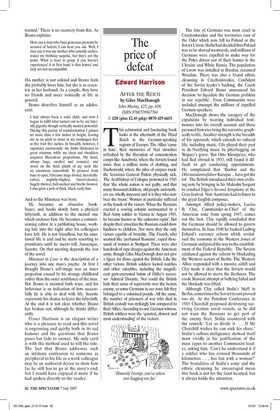The price of defeat
Edward Harrison AFTER THE REICH by Giles MacDonogh John Murray, £25, pp. 618, ISBN 9780719567704 © £20 (plus £2.45 p&p) 0870 429 6655 This substantial and fascinating book looks at the aftermath of the Third Reich in the German-speaking regions of Europe. The Allies 'came in hate', their memories of Nazi atrocities refreshed by the liberation of concentration camps like Auschwitz, where the Soviets found more than a million items of clothing, and Buchenwald, where the piles of corpses made the ferocious General Patton physically sick. The Archbishop of Cologne protested in 1945 that `the whole nation is not guilty, and that many thousand children, old people and mothers are wholly innocent and it is they who now bear the brunt.' Women in particular suffered at the hands of the victors. When the Russians erected a soaring column surmounted by a Red Army soldier in Vienna in August 1945, he became known as `the unknown rapist'. But despite their atrocities the Russians could show kindness to children. Nor were they the only victors capable of brutality. The French, who seemed like 'perfumed Russians', raped thousands of women in Stuttgart. There were also hundreds of rape charges against the American army, though Giles MacDonogh does not give a figure for those against the British. Like the other victors, British soldiers looted watches and other valuables, including the magnificent gem-encrusted baton of Hitler's successor Admiral Doenitz. Nor could the British hide their sense of superiority over the beaten enemy, so some Germans in our zone felt they belonged to a colonised people. All the same, the number of prisoners of war who died in British custody was strikingly low compared to their Allies. According to one German witness, British soldiers were the 'quietest, slowest and most understanding' of the victors.
The fate of Germans was most cruel in Czechoslovakia and the territories east of the Oder which now fell to Poland or the Soviet Union. Stalin had decided that Poland was to be shoved westwards, and millions of Germans were expelled to make way for the Poles driven out of their homes in the Ukraine and White Russia. The population of Lwow was installed in Breslau, renamed Wroclaw. There was also a brutal ethnic cleansing in Czechoslovakia. Confident of the Soviet leader's backing, the Czech President Edvard Benes announced his decision `to liquidate the German problem in our republic'. Even Communists were included amongst the millions of expelled German-speakers.
MacDonogh shows the savagery of the expulsions by weaving individual testimonies into his overall account and these personal histories bring the narrative graphically to life. Another strength is the breadth of his approach, which extends to cultural life, including music. GIs played their part in de-Nazifying music by jitterbugging on Wagner's grave. But Otto Klemperer, who had fled abroad in 1933, still found it difficult to get conducting appointments. He complained that 'Boehm and the Oberstandartenfiihrer Karaj an ... have got the lot'. The British introduced their own civilising note by bringing in Sir Malcolm Sargent to conduct Elgar's Second Symphony at the Graz festival. Now Austrians had to listen to the great English composer.
Amongst Allied policy-makers, Lucius B. Clay, Commander-in-Chief of the American zone from spring 1947, comes out the best. Clay rapidly concluded that the Germans should be allowed to govern themselves. In June 1948 he backed Ludwig Erhard's currency reform which revitalised the economy in the Western zones of Germany and paved the way to the establishment of the Federal Republic. The Soviets retaliated against the reform by blockading the Western sectors of Berlin. The Western Allies responded with a massive airlift and Clay made it clear that the Soviets would not be allowed to starve the Berliners. The crude Russian attempt at bullying failed and the blockade was lifted.
Although Clay called Stalin's bluff in Berlin, sometimes the Soviet tyrant proved too sly. At the Potsdam Conference in 1945 Churchill proposed destroying surviving German naval vessels, as he did not want the Russians to get part of the enemy fleet. Stalin countered with the remark: 'Let us divide it . . . If Mr Churchill wishes he can sink his share.' Stalin's callous malignance showed itself most vividly in his justification of the mass rapes to another Communist leader, asking him, 'Can't he understand it if a soldier who has crossed thousands of kilometres . . . has fun with a woman?' The brutalities of Stalin's army and the ethnic cleansing he encouraged mean this book is not for the faint-hearted, but it always holds the attention.



















































 Previous page
Previous page